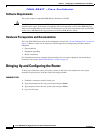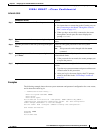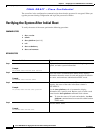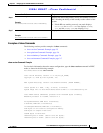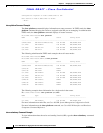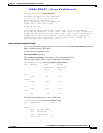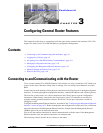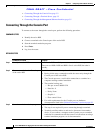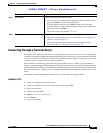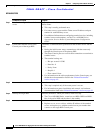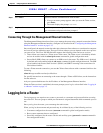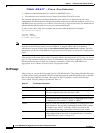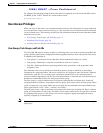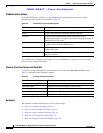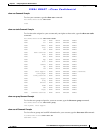
FINAL DRAFT —Cisco Confidential
3-2
Cisco ASR 9000 Series Aggregation Services Router Getting Started Guide
OL-17502-01
Chapter 3 Configuring General Router Features
Connecting to and Communicating with the Router
• Connecting Through the Console Port, page 3-2
• Connecting Through a Terminal Server, page 3-3
• Connecting Through the Management Ethernet Interface, page 3-5
Connecting Through the Console Port
To connect to the router through the console port, perform the following procedure.
SUMMARY STEPS
1. Identify the active RSP.
2. Connect a terminal to the Console port of the active RSP.
3. Start the terminal emulation program.
4. Press Enter.
5. Log in to the router.
DETAILED STEPS
Command or Action Purpose
Step 1
Identify the active RSP. Identifies the RSP to which you must connect in the next step.
There are two RSPs: RSP0 and RSP1. One is active RSP, the other is
standby.
Step 2
Connect a terminal to the Console port
of the active RSP.
Establishes a communications path to the router.
• During initial setup, communicate with the router only through the
Console port of the active RSP.
• The Console port uses a serial cable connection to a terminal or a
computer running terminal emulation.
• The terminal settings are:
–
Bits per second: 9600/11520
–
Data bits: 8
–
Parity: None
–
Stop bit: 1
–
Flow control: None
• For cable requirements for the Console port, see hardware
documentation listed in the
“Related Documents” section on page viii.
Step 3
Start the terminal emulation program. (Optional) Prepares a computer for router communications.
• The step is not required if you are connecting through a terminal.
• Terminals send keystrokes to and receive characters from another
device. If you connect a computer to the Console port, use terminal
emulation to communicate with the router. For instructions on using a
terminal emulation program, see its documentation.



